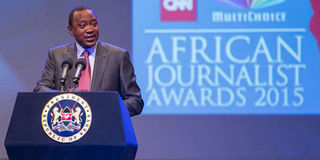We can draw a more accurate picture of the genuine narrative that is our Africa

President Uhuru Kenyatta speaks during The CNN/MultiChoice African Journalist 2015 Awards Gala at KICC, on October 11, 2015. He said that there is an Africa working to perfect its democracy, and there is the Africa that has undergone the quickest democratisation in history. PHOTO | NATION MEDIA GROUP
What you need to know:
- Kenya has connected 14,000 primary schools to electricity and 97 per cent of Kenyan primary schools are therefore now lit.
- There is an Africa working to perfect its democracy, and there is the Africa that has undergone the quickest democratisation in history.
- And I should mention Murithi Mutiga, who recently published a deeply researched and informative piece on Kenya’s green energy revolution, which brings power to some of the most marginalised among us.
I know you’re waiting for me to talk about hotbeds, but I won’t.
Not today. A few days ago, I was fascinated to learn that researchers have discovered that African elephants have elaborate mental maps.
They show a superb ability to remember where there is water, shade, and pasture.
If they get their mental map of the terrain wrong, they risk death. We are in equal need of accurate mental maps of our world.
The accuracy of our picture of reality depends on sound information and analysis. Like the elephant, we need to learn and remember faithfully: If we don’t, we can’t hope to escape or recover from the disasters that have befallen the continent in the past.
In large part, you members of the fourth estate draw our mental maps of Africa. Let us look at the pictures you drew this week.
I glanced at a global newspaper: Its Africa headlines were on the coup in Burkina Faso, a bombing in Nigeria, crimes in Mali, and the latest news about Ebola.
This came just after the UNDP report assessing Africa’s progress in meeting the Millennium Development Goals, which showed very encouraging progress: Child mortality rates fell by an average of 40 per cent in Africa as did poverty in most African countries while improving women’s access to political leadership faster than any other region on earth.
OVERCOMING CHALLENGES
Why exaggerate African failure? Why ignore African success? It is not surprising that foreigners get our story wrong.
What is surprising is that we too get our story wrong. Indeed, the coverage of terrorist attacks on Charlie Hebdo, or London, or New York, or 9/11 respected the dignity of the victims.
But our coverage of African tragedies often disrespects and devalues African lives. If we cannot respect the dignity of Africans, who will?
There is an Africa that is dignified. There is an Africa that was afflicted by Ebola, just as there is an Africa, backed by the African Union, which gave its skill, time, and money to save lives.
There is an Africa at war, but African peacemakers in Amisom are ending some of our most intractable conflicts.
There is darkness on the continent, and yet, in the last two years, Kenya has connected 14,000 primary schools to electricity and 97 per cent of Kenyan primary schools are therefore now lit.
There is an Africa working to perfect its democracy, and there is the Africa that has undergone the quickest democratisation in history.
I have heard of an Africa that is hopelessly dependent on aid and charity, but the Africa I know has some of the world’s fastest-growing economies, powered transformation in technology, and billions of investments in infrastructure.
A VITAL ROLE
Stereotypes have an amazing ability to destroy our ability to see the facts. We who love Africa must stand up for her truths.
What do headlines tell us about the crisis in Europe of migrants from Africa and the Middle East?
When these suffering people travel across the Mediterranean, they become migrants. When they enter Kenya, they are refugees.
Kenya, which has hosted over a million refugees from Somalia, is criticised for seeking their repatriation to homes that our soldiers have helped secure at great cost.
Meantime, European nations close their borders, and we are told that their security and cohesion demand it.
In truth, we depend on you, African journalists, to change the mental maps that lead us astray.
With your help, Africa can represent itself aright. You who stand with us here can honour the struggles and heroes of the African past by looking carefully, and speaking truthfully, about our continent.
ACCOMPLISHED INDIVIDUALS
One of our judges today is Ferial Haffajee, who with others, led a campaign to bring antiretrovirals to some of the most vulnerable South Africans.
We also have with us Joel Kibazo, a veteran journalist who wrote about African businesses and businessmen when few global outlets had any time for them.
And I should mention Murithi Mutiga, who recently published a deeply researched and informative piece on Kenya’s green energy revolution, which brings power to some of the most marginalised among us.
So, today, we celebrate these men and women, and all of you who uphold the highest standards of your profession. When those high standards are the norm, we will reclaim the African narrative.
This is an abridged version of the speech that President Kenyatta gave during the 2015 CNN Multichoice African Journalist of the Year Awards at KICC.




